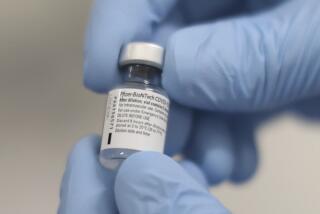AIDS Study to Test Condoms, Spermicides
- Share via
In a unique research project, scientists in Los Angeles soon will begin a federally funded human study to see if condoms and spermicides can prevent the spread of the AIDS virus.
Tests have suggested that spermicides can kill the AIDS virus in a laboratory dish, but no tests have ever been done to test their effectiveness in humans.
And despite longstanding recommendations from public health officials that high-risk people use condoms, the ability of condoms to act as a barrier to the passage of the virus has never been thoroughly tested.
Thus the study, funded by a $2.5-million grant from the National Institute of Child Health and Human Development in Bethesda, Md., will be the nation’s first in-depth effort to learn whether products in common use by millions of people for contraceptive purposes may help stem the growing number of AIDS cases.
But before the human trials begin, the investigators must first spend about a year doing extensive laboratory tests on a half dozen or so chemicals used in spermicides worldwide in order to assess their ability to deactivate HIV, or human immunodeficiency virus, the organism that causes acquired immune deficiency syndrome.
Among these chemicals will be benzalkonium chloride, the active ingredient in a French spermicide that received considerable publicity this week when scientists at the Pasteur Institute in Paris announced that it kills the virus in laboratory dishes. All brands of condoms sold in the United States will also be tested to see whether they block passage of the virus and can withstand stresses without breaking.
According to Anne Coulson and Dr. Roger Detels of UCLA’s School of Public Health, the principal investigators in the study, the researchers will select one spermicide and one condom brand that will be used by the volunteers.
Although the researchers would prefer to conduct the study with both heterosexual and homosexual volunteers, Detels said it may be difficult to find enough reliable heterosexuals who are at high risk for AIDS, such as intravenous drug users, prostitutes and their sexual partners, and who can be depended upon to show up for follow-up studies. Another complication is that a case of AIDS due to contaminated needles cannot be distinguished from one acquired sexually.
Consequently, Detels said, it may be necessary to use only homosexual subjects. They would be recruited mostly through gay organizations. It is possible, he said, that the spermicide-condom combination could be studied in Africa, where many countries have sizable numbers of high-risk heterosexuals who might participate in the study.
The pilot study, which will involve about 400 volunteers, presents the investigators with an ethical dilemma that also will complicate a clear-cut finding from the study.
Like most studies of this kind, the subjects will be divided into two groups of equal size. One group will receive condoms and spermicide, the other will not.
For ethical reasons, both groups must be advised of safe sex practices, which include using condoms and not practicing anal intercourse.
But in order to make the two groups as different as possible so that their results are more clear-cut, the researchers will give the treatment group--but not the control group--an intensive educational program on safe sex. The control group, on the other hand, will be told that they will not receive either further education or condoms or spermicides.
Selecting the subjects is expected to be a difficult and time-consuming task, Detels said. The treatment group, for example, will consist only of those who say they will use the spermicide and condoms but intend to continue anal sex, an act which is regarded as likely to increase the chances of acquiring AIDS.
The subjects will be followed for one year and the number of cases of AIDS in each group compared to see whether condom-spermicide use results in a lower rate.
Other investigators in the study are Dr. Robert Nakamura and Dr. Gerald Bernstein of the USC School of Medicine and Dr. Bruce Voeller, president of the Mariposa Education and Research Foundation.





